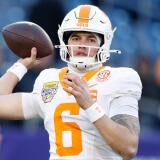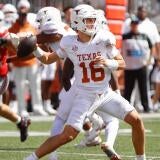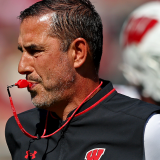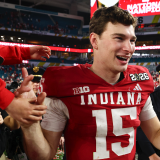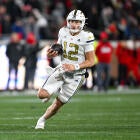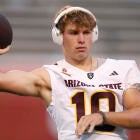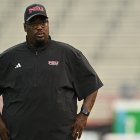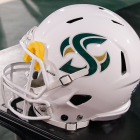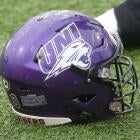
Why UCF quarterback McKenzie Milton is trying to play college football again after his horrific leg injury
Milton has many reasons why he wants to return to the field even after his gruesome injury last season
ORLANDO, Fla. -- Football must be quite a drug. McKenzie Milton readily admits that now that he has decided to try and play football again after a gruesome leg injury.
Milton's decision surprised many, but no one is counting him out.
- "I was shocked when I heard," the mother of the UCF quarterback said.
- "I couldn't even put that story into words," said Mazzi Wilkins, the USF defensive back who made the tackle that shredded Milton's knee in the 2018 regular-season finale for both teams.
- "If anybody can come back, he can," said Scott Frost, the UCF coach (now at Nebraska) who unlocked Milton's quarterback talents.
- "It would be one of the biggest -- if not the biggest -- story in college football," said current Knights coach Josh Heupel.
It's obvious that while Milton's body heals, the discussion has evolved since that horrific day eight months ago in Tampa when Wilkins hit Milton at the end of a run in the first half of the Knights' 38-10 victory vs. the Bulls.
It wasn't until Milton rolled over and his lower leg appeared to be hanging from his knee like a wet rag, that the extent of the injury became obvious. Milton's knee was mangled in such a manner that turned the stomachs of anyone who saw it.
Those who saw it up close on the field either took a knee and prayed or averted their eyes.

If the same injury happens on the battlefield and there is no military hospital, soldiers die according to former Army superintendent Robert Caslen who was consulting at UCF at the time.
After Milton was rushed to Tampa General Hospital, doctors had to take an artery from his left leg and sew it into his right leg. Nerves were damaged. Milton couldn't feel his right leg.
Amputation? Suddenly, that was in play.
"When they came into the emergency room and said, 'Well, we saved the leg,' I was taken aback," Teresa Milton recalled. "I said to everyone, 'Did anyone else know he could lose the leg?'
"Our orthopedist from the team looked at me like, 'They all knew.' "
That discussion has now evolved to the possibility – at least in Milton's mind – of a return to the football field by one of the most exciting players of the second half of the decade.
At stake would be the continuation of a lifelong dream. It also would be another indicator of football's addiction. On this 150th anniversary of the game, it is a reminder that those who play it and those who watch it, can't get enough.
These 13,000-plus players at the FBS level play the game because they can. many also play because they have to. They want the memories, the brotherhood. Yes, they relish both delivering and surviving the brutal hits, too.
They understand the risk of head trauma, joint tears, broken bones and – for Milton – even the function of a leg.
"I realize now that football players play football until they can't anymore," Teresa Milton said. "That is their passion."
"Mama T" has become the de facto spokeswoman for her son during the ordeal. That has revealed her as a mama bear, on guard protecting Milton's best interests.
She worried about the elevator going out on their third floor apartment during the recovery, because how could McKenzie make it down the stairs? They had groceries delivered instead of venturing out. At one point, Mama T realized both of them had become "really white" because they hadn't been outdoors in weeks.
"I don't know what led me to tell you that," Teresa Milton said.
She can't quite comprehend a comeback either. It would be glorious but it would also be dangerous. Mama T has compared her son son's desire to return to the surfers in their native Hawaii who ride until the last wave.
"I know God allowed it to happen," Teresa Milton said of her son's injury. "I don't know why."
The next chapter is already being written as the season nears. Everything Milton does is to get back on the field. That includes absorbing the love and advice from his friends and family.
Why are you telling national media that you're coming back, his mom asked?
"His reply was, 'If I don't believe it, nobody will,' Teresa Milton said.
"OK, then," she told herself.
"That was an [upset] stomach and bawling my eyes out because I wasn't ever in that state of mind," she said.
The Miltons know football and they know Hawaii. For 17 years they ran the Waipio Panthers Football League back home in Oahu. Alabama quarterback Tua Tagovailoa's face lit up when he recalled the days when he was Milton's quarterback. Try envisioning that superstar backfield with Tagovailoa taking the snaps and Milton playing running back and slot receiver.
Three years ago the family moved from Hawaii to Orlando when Milton chose UCF over Oregon, Navy and others.
"He wasn't very big, but he was a baller," Frost recalled. "When we got to UCF he was one of our first calls. I had high hopes for him. He exceeded those."
Eight months removed from the injury Milton is walking with a brace. Running is in his future. If you project out the prognosis, he could return in October 2020.
Let's back up to what a comeback would involve. On Nov. 23, Milton tore his lateral collateral ligament and posterior cruciate ligament and dislocated his knee. He didn't have any immediate pain or feeling because of the nerve damage.
In a first-person ESPN.com story earlier this year, it is amazing how Milton recalled the tiniest detail of the day he was injured.
"I think I do want to remember it," Milton said. "It's the biggest thing in my life so far. I think I'll be a better person for it."
Tampa General Hospital vascular surgeon Brad Johnson and his team were the ones who saved the leg. In the aftermath, it was conveyed to the patient the best possible result was for Milton to be able to walk again without pain.
Then it got complicated: Milton made it known he wanted to come back.
"The doctor, at first, was like, 'Why do you want to play again?,' Teresa Milton recalled. "I remember him [pulling] his glasses down and saying, 'This is to repair your leg for a normal life and to be pain free. That's what the goal is.'
"They had a very intimate conversation. He told McKenzie, 'I support you.' I was hoping he would discourage him. That is, you know, being a mom.
"I said, 'So if he hurts his knee again are you going to fix it again?' He's like, 'Of course I would.' "
America's football addiction also has a dark side. Wilkins began getting death threats. Some misguided trolls thought his tackle was meant to injure.
"If you watch the tape, I put my hands around my head [in shock]," Wilkins said. "I circled back around him and took a knee. I was really close to him and began praying for him."
The two became friends when they both appeared at a Better Man Event in April at UCF.
"It was like the event was based on forgiveness," Wilkins said. "We came to a mutual understanding that in football things happen. We hit it off and became really good friends."
Wilkins understands why Milton wants to play again.
"Nobody can really know what goes on on the field unless you're on the field," he said. "It's like a fraternity thing. No matter how much crap, no matter how much media wants to hype up stories about teams, at the end of the day we're all going to respect each other."
Respect is one thing. Common sense is another. Players at every level have never been more educated about football's risks.
Milton became close to three individuals whose situations should have caused him to swear off football forever -- High schooler Alex Ruiz, NFL player Zach Miller and Michigan player Grant Newsome.
They all suffered the same injury. Ruiz ended up having the lower half of one leg amputated. After nine years in the NFL, Miller retired. Newsome was hurt in an October 2016 game against Wisconsin.
Newsome eventually made it back to participate in Michigan offseason conditioning drills in 2018. Last August he retired from the game, becoming a graduate assistant.

"I think something like that can happen anytime you put on the helmet," Milton said. "Just like boxing, MMA fighting or NASCAR driving. They're all dangerous sports. I think that's why people love it, the exhilaration of it, the ecstasy of it."
There it is again, the drug of football.
Milton believes it can happen in a spiritual way. The week before a state championship game, Milton had suffered a sprained hand. He couldn't grip the ball. He certainly couldn't throw.
During services at Hope Chapel Nanakuli, both Milton and his mother recounted how a pastor laid on the quarterback while the congregation prayed over him.
"I went over to his church, and said, 'Does anyone here have the gift of healing?," Teresa Milton said. "This guy says, 'Yeah, I do.' "
Within 48 hours of that church visit, Milton was throwing rockets. Later that week he threw for seven touchdowns in the state championship game
"That was definitely the work of God," Milton said.
"My son experienced a miracle," his mom said.
So why can't it happen again?
"I think it's really likely," Heupel said of Milton's return. "We're going to speak it into existence."
Milton is as assimilated into the UCF football program as possible. He works out with his teammates. (No leg exercises, obviously.) He'll be a member of the Knights' traveling squad this season.
In that sense, Milton has been called the cheapest quarterback coach in the country.
"I love that kid for a lot of different reasons," UCF athletic director Danny White said. "I work out a bunch most days. Just last week I sat down in the nutrition center to eat lunch. I'm in there 10 minutes. I say hello to all the kids.
"The first time all year anybody comes and sits with me it's McKenzie. He's not on crutches anymore. It's such a mature thing to do. Who wants to go sit with the AD?"
In January, Milton endured a lengthy follow-up surgery at the Mayo Clinic. He'll be back in Minneapolis at the end of the month for the latest checkup as Milton's long journey back to the football field continues.
Whether the comeback miracle comes to pass, one truth endures -- Football in America continues to be quite a drug.
"It is," Milton said. "It's amazing."



